Backup

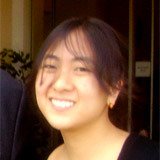
Reina Chano '09 is an Honors history major and peace & conflict studies minor from Tokyo, Japan. She is a co-coordinator of Swarthmore TOPSoccer, and spent last summer working at a camp for children with autism with support from the College's Lang Center. Her current activities include chugging cups of tea and searching for pots of gold at the end of every rainbow, of which, she says, "there are many!" Write to her at rchano1@swarthmore.edu

Maurice Weeks '09 is an Honors sociology and peace and conflict studies major from Maplewood, N.J. He plans to spend part of this summer working on an organic farm in Spain, then assisting Lang Visiting Professor of Issues for Social Change George Lakey in his research. He calls his team's win last year of the first Garnet Chef competition a "crowning achivement." Write to him at mweeks1@swarthmore.edu.
 warthmore's newest study abroad program opened this spring in Derry/Londonderry, Northern Ireland, with a deliberate focus on the country's ongoing peace process. The program is largely organized around the work that students engage in with local community groups dedicated to, and heavily involved with, creating civil society organizations and processes which foster peace.
warthmore's newest study abroad program opened this spring in Derry/Londonderry, Northern Ireland, with a deliberate focus on the country's ongoing peace process. The program is largely organized around the work that students engage in with local community groups dedicated to, and heavily involved with, creating civil society organizations and processes which foster peace.The semester started rolling the moment we stepped off the plane. The drive from the airport into Derry/Londonderry is something that can keep your eyes open even with extreme jet lag. Rolling hills, baby sheep and more shades of green than you could possibly imagine. Absolutely beautiful!
Denise Crossan, our program director, introduced us to the sectarian and social status of Northern Ireland with a drive through the housing estates. We drove past Catholic/Nationalist/Republican neighborhoods, peppered with colors of green, yellow, and white on lampposts and curbstones, and saw Protestant/Loyalist/Unionist areas with their colors red, white, and blue. Powerful murals immortalize members of the civil rights movement, paramilitary groups, and the victims. A short drive into Donegal, part of the Republic of Ireland, helped us appreciate how easy it now was for people to go between the Republic and Northern Ireland, when before, the roads had been riddled with army blocks. That day, we drove up to Grianan Fort and had a chance to be absolutely dazzled by the scenery.
The anniversary of the events known as "Bloody Sunday" took place early in our stay. We both attended a number of events that marked the somber occasion, including a talk by Bishop Daly, commemorations for other less known horrific events like the Ballymurphy incident, and a talk from the former police ombudsman Nuala O'Loan. Listening to stories from both communities shared in such an open manner throughout the week left us feeling quite raw and shocked.
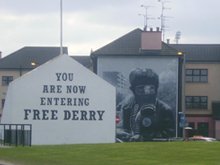
caption1
Throughout the semester, we have gotten to meet incredible people working at a grassroots level to enact change and bridge the gap between Northern Ireland's communities: from Anne Murray, principal and a founding member of Oakgrove Integrated Primary, Derry/Londonderry's first integrated school, to Paddy "Bogside" Doherty, a legendary figure who led the Free Derry Movement and essentially rebuilt the city of Derry/Londonderry after the Troubles. It is said that if one wants to see Paddy's legacy, one need only to look around.
Paddy left us completely star struck. His first words to us were his motto: "It is much easier to seek forgiveness than to ask permission." This is something he used to define his work and is a common theme that runs throughout the influential peace-makers we have met - taking risks.
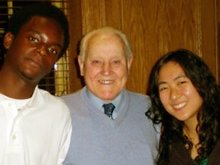
caption2
When I arrived at his house in the Bogside, which he had built himself, the door was wide open. Much too timid to simply walk in, I rang the bell. He came out and ribbed me a bit - "the door's open for a reason, it's always open so people can come in" - and then ushered me inside. At the end, he handed me his book and told me to come back anytime.
Paddy leaves his door open - always. Anyone can walk in and talk to him, from a random college student to individuals in the Bogside, to community leaders from the Protestant/Unionist/Loyalist communities. To put it bluntly, I think it's the most badass thing I've ever seen. I think it highlights the profound amount of respect this man commands in this city, and beyond. As a critical leader, Paddy has taken on so many risks over the years, including many that threatened his life, for the good of this city and its citizens. The open door is symbolic of his many actions, risks taken, and achievements.
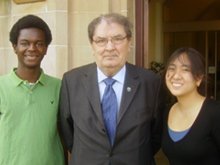
caption3
Our classes at the university are a welcome supplement to our learning experience and give theory to some of the things we have seen. The most significant is Paul Arthur's "Politics of Divided Societies." Paul was crucial in the peace process and is well-published on the Northern Ireland problem. In addition, we both have different community placements - Mo with the Holywell Trust and Reina with Verbal Arts Centre.
Our program, while demanding, is full of good craic - from car rides into Donegal to a day out on the Causeway Coast and seeing Mussenden Temple to the Giant's Causeway, Dunluce Castle, and Bushmill's Distillery. The best event was when we went bowling. Reina learned the benefits of beautiful little things called bumpers, Maurice showed no mercy on her, and Denise, or her young children Hannah and Louise, beat them all soundly. No shame whatsoever.

caption4
This program has been more than we could possibly hope for. The number of people we have had the opportunity to meet, and the craic among the local people of Derry/Londonderry, provided wonderful opportunities to take part in experiential learning in a society coming out of conflict. Above all, our program director, Denise Crossan, should be commended for her commitment to giving us the best program possible and her role as our teacher, cultural broker, coordinator, advisor, and friend. The program is a huge success because of her.
Oh yeah, and craic means good natured Irish fun or banter.Maurice describes his work with the Holywell Trust and some of his activities outside of class.
"Maurice, we're facilitating a good relations workshop for this group and we were wondering if it would be something you are interested in helping out with?" I have facilitated groups before, but nothing very official, and certainly never a group of people who are from the country where I just arrived! "What kind of group is it?" I asked. "They are members of The Orange Order from rural areas. They will be mostly farmers, white, and conservative." "So, the opposite of me in every way?"
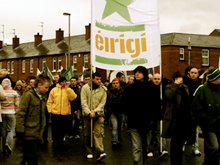
caption5
The Holywell Trust (www.holywelltrust.com) is a community organization in Derry/Londonderry which seeks to peacebuild through healing, understanding and fostering cooperation. It has been a dream placement. I knew I had to work Eamonn Deane, the director, as soon as I met him. Similar to Paddy, Eamonn and Holywell take chances not only on people, but on ideas. These risks can be in many forms, such as setting up workshops between controversial groups, or allowing an American intern to coordinate events and assist in facilitating trainings. Holywell is well respected in Derry/Londonderry for this very reason.
I come to Holywell anytime I don't have class to attend. The office atmosphere is what I will miss the most. Everyone gets all of the work done that they need to, but much fun is still had. A work day isn't stressful in the same way it can often be in America.
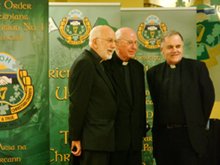
caption6
Holywell has also been supportive of my big research project about immigrants in Derry/Londonderry. The immigrant population, especially from Eastern Europe, has greatly increased with the expanded European Union working provisions, and some groups have expressed difficulties living in Northern Irish society. In order to study this, I made contact with community worker Eddie Kerr of SEEDS, an immigrant group in Derry/Londonderry. He has been amazingly open to my research plan and helpful in organizing focus groups, interviews, and providing me with information.
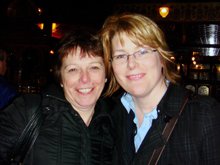
caption7
I'm also teaching myself to play the guitar (and picking it up quite fast, I have to say). I also have a great group of flatmates. It was a big help to be put in a flat with Northern Irish people my own age. Even though I am quite busy with everything, I wouldn't change it for anything. Reina describes her work at the Verbal Arts Centre and some of her activities outside of class.
I had about a dozen students, aged 10 to 12, from two grammar schools in the area. We had just gone to the recording studio for a quick session and were heading back upstairs where the rest of the 50 students were busy working on their digital stories. Hannah, though, had become captivated by the quilts on display in the front hall. She stayed behind, trying to count the number of small, blood-red squares that were stitched, overlapping each other, onto a black background. Each square represented a person who had been killed in the course of the Troubles. There were many squares.
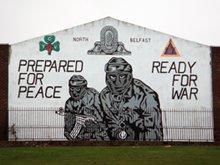
caption8
I am interning at the Verbal Arts Centre (VAC) www.verbalartscentre.co.uk, an educational charity organization which hosts a large variety of programs, all centered on providing Northern Ireland communities and individuals with a safe place and space to "tell your story." The VAC was the first organization in the region devoted to the promotion of community relations through raising awareness and actively celebrating the language arts.
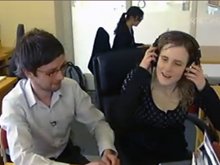
caption9
My big project at the VAC has been designing a new educational program. As the VAC are looking to expand their available community relations, educational "See Me See You" programs, I've been assigned to design a community relations curriculum using Bill's New Frock, a book about a little boy who turns into a girl for the day. A pilot program was run in Enniskillen several weeks back, with great success. As someone with a growing interest in education, it has been an incredibly rewarding and challenging experience. Absolutely great craic!
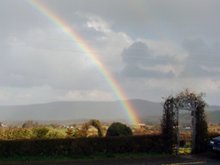
caption10
Outside of work and class, I am a member of the Hillwalking Club. As many Sundays as I can, I go on weekly hillwalks around the scenic mountains and trails of both Northern and Southern Ireland, all for three pounds. The group is a fun mix of locals, university students, and international students. It has become my main avenue for meeting people and having a great time. You can't help bonding with someone when you share so many special moments, like stepping in a mound of sheep poop or clambering over amazing rock formations while the weather switches rapidly from sunny to windy to rainy to hail and back to sunny. On our last walk, which took place in Glenveagh National Park in Letterkenny, we saw five rainbows in a row - absolutely spectacular.
Goto page 1
Goto page 2
Goto page 3


